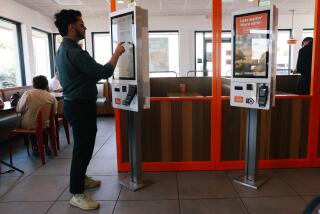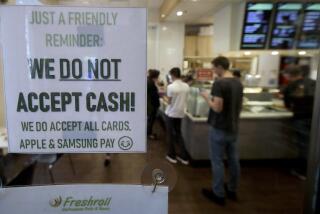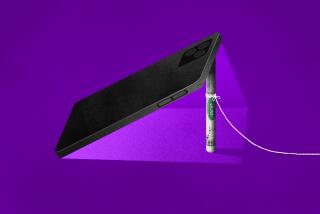Makers of smartphone credit card readers are ringing up sales
- Share via
Brothers Adam and Ben Mayberry, who sell T-shirts to the crowds outside San Jose Sharks games, say a small piece of hardware that plugs into their iPad and allows them to accept Visa, MasterCard and American Express has boosted sales and legitimized the curbside business.
“I wouldn’t know the first place to begin at taking payments, or credit card payments in general,” Adam Mayberry, 31, said of the payment device offered by San Francisco start-up Square Inc. “It’s a cool technology. It interacts with our customers and gives them the comfort that what we do is kind of cool.”
Google Inc., PayPal and the major wireless phone carriers are also racing to combine mobile technology and cloud computing to change how people pay for things in the offline world, and how retailers connect to their customers, even within their stores. All are developing new products, including the Isis payment system organized by Verizon Wireless, AT&T Inc. and T-Mobile USA that will allow consumers to pay with a smartphone. Isis will have a limited launch this year and a national rollout in 2013.
Square said it signed up more than 1 million small and mid-size businesses like Mayberry Workshop in its first year of operation in 2011, and it is on the leading edge of a trend that has Internet companies increasingly vying to claim a piece of the payment process in off-line retail. Square allows anyone to accept major credit card payments using an iPhone, iPad or Android mobile device.
“We went from basically nobody using Square to a million businesses all across the United States,” said Keith Rabois, Square’s chief operating officer. “Our growth is accelerating. The opportunity in front of us is vast.”
Square, which had about 30 employees a year ago, expects its 200-person workforce to more than double in 2012. The start-up said its payments volume nearly quintupled from March to October to a rate of more than $2 billion a year, and it processed $11 million in payments one day in November.
Intuit Inc., meanwhile, saw 1,000% growth during 2011 in adoption of its free GoPayment credit card reader, which can also receive credit card payments through an iPhone, iPad or Android mobile device.
Intuit spokeswoman Sharna Brockett said the economy “is still tough. So as a small-business owner, you can’t really afford to miss a sale anymore. Turning away a customer because they don’t have cash is tough, so a lot of business owners have decided it’s better to accept all payment options.”
Google has entered the payments market in a limited way with its Wallet smartphone app, which allows consumers to make purchases in big chain retailers like Gap Inc. and convenience stores like 7-Eleven by tapping a smartphone equipped with near field communication technology on a checkout line sensor.
But in a high-stakes battle with wireless giant Verizon, which is using the same technology for the Isis system, Google Wallet is limited to a single smartphone on a single carrier — the Samsung Nexus S phone on Sprint.
Verizon spokeswoman Heidi Flato said that, contrary to some reports, the carrier is not blocking the payments app on the new Google-branded Galaxy Nexus phone.
“Google Wallet does not simply access the operating system and basic hardware of our phones like thousands of other applications,” Flato said. “Instead, in order to work as architected by Google, Google Wallet needs to be integrated into a new, secure and proprietary hardware element in our phones.”
Verizon, a Google spokeswoman countered, “asked us not to include this functionality in the product.”
The spat is one measure of how important the companies believe off-line payments will be. Google’s proposed $12.5-billion purchase of Motorola Mobility would allow it to ensure future Motorola phones have the payments technology, said Leslie Hand, research director for IDC Retail Insights.
PayPal is also working on a menu of near field communication-based products starting this year, such as the ability to transfer money from one phone to another by bumping them together, as well as using them to make payments.
“PayPal is re-imagining money,” then-President Scott Thompson said in a recent blog post.
While analysts are watching to see whether Apple will offer its own payment service with the iPhone, IDC said in its annual prediction report that there will be more than 500 million near field communication-enabled phones in the hands of the world’s consumers by the end of 2015, driving adoption of smartphone payments.
Still, analysts disagree whether consumers want to ditch their debit and credit cards to pay with a phone.
“Yes, you can argue that it’s pretty convenient to have it on your cellphone, but it’s pretty convenient to have a debit card in your wallet too,” said Van Baker, an analyst at Gartner Inc. “While there are some advantages for the merchants, there aren’t many advantages for consumers.”
Square said it benefits consumers by offering credit card purchases and helps small businesses by giving them access to the powerful data-analysis services of a cloud computing company.
That allows small businesses to compete on a more equal footing with the big guys, Square’s Rabois said.
“Because we process and track these transactions and allow their businesses to run their inventory off an iPad, we can also provide analysis at the end of the day that can provide suggestions for how they can grow their business more quickly and make more profit,” he said.
The Mayberry brothers say Square has been a boon for business because many fans on the way to a Sharks game aren’t carrying enough cash to buy a T-shirt. The technology also allows the Bay Area-themed “alternative sports apparel” company to bask in the reflected aura of Apple’s popular products.
“They swipe [a credit card] on the iPad, and then sign on the iPad with their finger,” Adam Mayberry said. “They’re like: ‘These guys are not just bootleg people making a quick buck on the side of the street.’”
Swift writes for the San Jose Mercury News/McClatchy.
More to Read
Inside the business of entertainment
The Wide Shot brings you news, analysis and insights on everything from streaming wars to production — and what it all means for the future.
You may occasionally receive promotional content from the Los Angeles Times.










